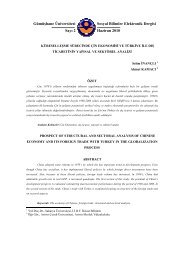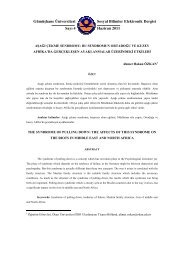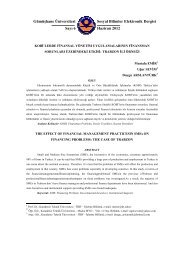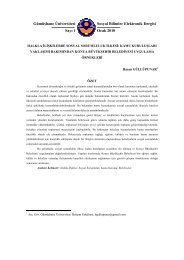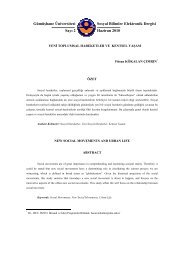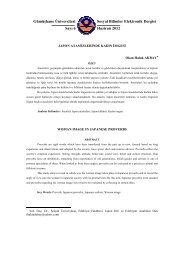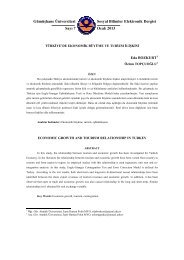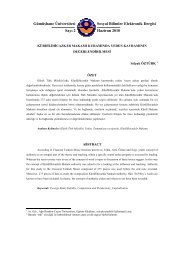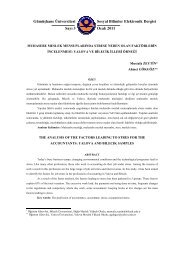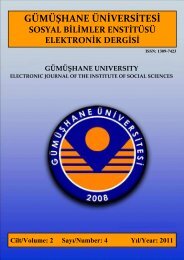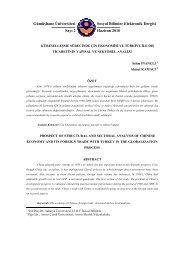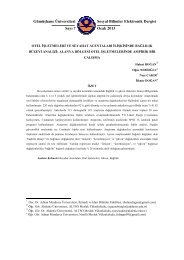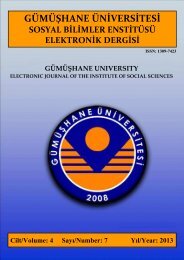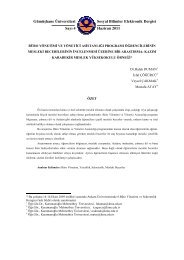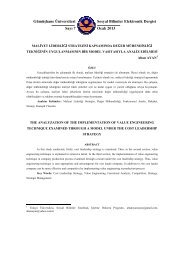S - GÜ SBE Elektronik Dergisi - Gümüşhane Üniversitesi
S - GÜ SBE Elektronik Dergisi - Gümüşhane Üniversitesi
S - GÜ SBE Elektronik Dergisi - Gümüşhane Üniversitesi
Create successful ePaper yourself
Turn your PDF publications into a flip-book with our unique Google optimized e-Paper software.
Historical Development of Nato Stanag 6001 Language Standards Ekrem SOLAK<br />
and Common European Framework (Cef) and The<br />
Comparison of Their Current Status<br />
proficiency which substantially exceeds the base skill level but does not fully or consistently meet all of the<br />
criteria for the next higher base level.<br />
B. Current Applications of NATO Language Issues and NATO Stanag 6001 Scale<br />
Although English and French are official languages at NATO, English is the operational<br />
language and the teaching, testing, and using the English language within the NATO<br />
community have become more important because of the addition of new countries and<br />
increasing number of joint tasks such as peace support operations. Due to the vitality of the<br />
language issues, the Bureau of International Language Coordination (BILC) was established<br />
within the NATO Training Group (NTG) / Joint Services Subgroup (JSSG) as a consultative<br />
and advisory body for language training matters in NATO. The BILC has the following<br />
responsibilities:<br />
• To review the work done in the coordination field and in the study of particular language topics<br />
through the convening of an annual conference and seminar for participating nations.<br />
• To act as a clearinghouse for the exchange of information between participating countries on<br />
developments in the field of language training.<br />
• To provide the sponsorship of STANAG 6001, Language Proficiency Levels.<br />
(www.dlielc.org/bilc/Constitution2004.doc).<br />
It has been stressed at the BILC Conferences and Seminars that competency in English<br />
language skills is a pre-requisite for participation in exercises, operations, and positions to<br />
NATO Multinational Headquarters in all branches. The goal is to improve English language<br />
skills of all personnel who are to cooperate with NATO forces in Partnership for Peace (PfP)<br />
operations, exercises, and training with NATO staff. These individuals must be able to<br />
communicate effectively in English with added emphasis on operational terminology and<br />
procedures. Such goals state that nations should not only address special measures to increase in general<br />
the language proficiency of current officers and NCOs but also the integration of adequate language<br />
training as part of their normal career development to ensure adequate language proficiency for future<br />
officers and NCOs. (NATO Partnership Goal PG G 0355, Language Requirements, 2004). On the other<br />
hand, as an advisory body, BILC offers consultations on language training and testing issues, but<br />
39



